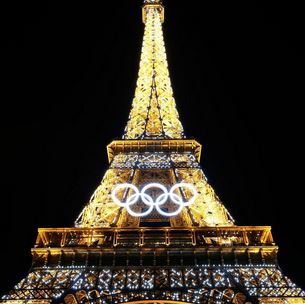Podcast: Play in new window | Download
Subscribe: RSS
Upon returning from an extended vacation with family, I have watched precious few hours of this year’s Summer Olympics from Paris. Nothing against NBC, but the nightly coverage comes across as scripted as today’s politicians reading from a teleprompter.
When the Olympics originate from across the ocean five or six time zones earlier than the US, the network has to make some difficult decisions on the coverage. The traditional news outlets have already told you that swimmer Katie Ledecky blasted the field by more than 20 seconds to win another gold medal in the 1500 meter freestyle event.
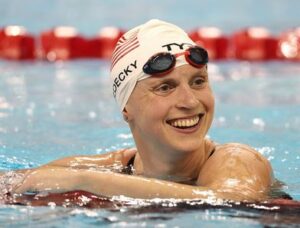
Even if you know the outcome, NBC still has to cover that one.
The television coverage is much like PGA Golf tournaments when the announcer says, “Let’s go over to #17” as a golfer in 20th place sinks a 50-foot putt for a birdie. Before they even run the videotape, you already know that this golfer is going to drain such a long putt.
It’s much the same in the tape delayed Olympic format of coverage from NBC.
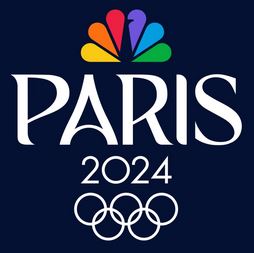
With a three hour nightly window, the Peacock network rarely gives us a long enough view of any particular event. Instead, you can almost guarantee that the prime time coverage will either feature a happy US winner or some type of very sad or tragic ending for an athlete.
That means that basketball fans will be lucky to get 10-15 minutes of highlights rather than watching an entire game. The network knows that the average home viewer (mostly female) doesn’t enjoy watching NBA or WNBA basketball players drilling an overwhelmed opponent. It just isn’t very exciting for television.
If you have cable television, you can watch many of the events via USA Network. If you’re willing to spend another $7.99/month to watch NBC’s internet site called Peacock, viewers may watch nearly every televised event at the Olympics.
Those who wanted to watch the BMX (bicycle motocross) races, surfing (not on the not-so-pristine Seine River – it was held in Tahiti) and even break dancing (yes, it is now an Olympic sport) will need to shell-out the cash for Peacock to watch it.
Watching the Olympics – either in depth or just the highlight shows – is a nice way to stay inside during the searing mid-summer heat. Since I’ve never been overseas, it has been fun to see Paris and the surrounding regions without having to get a passport to do it.
Of course, there have been controversies!

Many sports can be dangerous. Boxing (whether by men or women) tops my list. Anyone who has ever watched a “Rocky” movie knows that brain damage (CTE) from receiving repeated blows to the head is likely to cause short and long-term mental issues for boxers.
Ask any of the living opponents of former Olympic gold medalist George Foreman.
Men’s boxing is brutal enough. After becoming an Olympic sport during the 2012 London Summer Olympics, women’s boxing has felt downright cringe worthy to watch – especially this past week in 2024.
Yes, equal rights means that women should have the right to emulate any of the dumb things that men have been doing for decades. I remember that my Mom would leave the room when Dad watched Friday Night fights on television a few decades ago. Much like football, it can provide a lot of excitement – until someone really gets hurt.
This brings us to the biggest controversy at the Paris Olympics…
It is one thing for one woman (of similar weight and physical build) wanting to box against another woman. If someone who looks like a man and genetically tests like a man wants to climb into the boxing ring against a woman, that’s another matter.
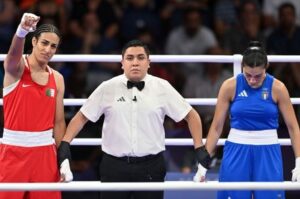
Watching the Italian lady boxer walk away after spending just 40 seconds inside the ring with a (cough) female Algerian boxer (who was taller and looked a lot like a guy to most of us) was the most memorable highlight of the first week of the Paris Olympics.
Don’t forget about another boxer from Taiwan (with similar suspicious genetic markings) who has been competing against the women boxers the past week, too. As of this writing, both are going to win a medal. It would be fitting to see the two of them in the gold medal event.
Regardless of whether these two boxers are cheating or are simply unfortunate genetic exceptions, the Paris Olympic Committee should never have allowed these two to compete in the women’s bracket.
It’s a shame that someone will have to be seriously injured before this issue resolves itself.
Chinese swimmers say, “Where’s the beef?”
Last week, the men’s 100 meter freestyle swimming finals were held. The competitors swim 50 meters to the other end of pool and return. It’s a fast and furious race.

The winning swimmer was 19-year old Pan Zhanle from China. He broke a world record at 46.4 seconds and won by a full second over a very competitive field.
Afterwards, the Australian swim coach, Brett Hawke, loudly proclaimed that no swimmer was capable of winning by a full second at the Olympics without some type of cheating involved.
“That swim was not real life. Not in that pool, not against that field,” said the Aussie coach.
The Chinese swim team had been scrutinized for drug issues in the prior Summer Olympics in Tokyo. This year, two of their swimmers tested positive for a banned muscle-builder called D-Bol. The Chinese then blamed food contamination from cattle which had received the banned substance.

In the 1980’s, Wendy’s Hamburgers featured commercials with geriatric lady Clara Peller asking, “Where’s the beef?” China’s swim team claims not to have known what’s IN their beef.
R-i-i-i-ght!
Eye Spy – Canadian version
Also last week, Canada’s Olympic soccer officials admitted that they routinely used drones to spy on their competitors. The women’s soccer team spied on opening round opponent New Zealand. After being caught in the act, Canadian coach Bev Priestman resigned from the team and then spilled the beans that Canada’s men’s team was doing it, too.

Canada’s women’s team has received a “punishment” by having deducting six scoring points from their team total. Though that definitely hurt the team’s chances of winning an Olympic medal, a full disqualification seemed to be in order.
The Lady Canucks are now 3-0 coming out of this weekend and still in the chase for a medal. If they should keep winning, Canada may still go home with an Olympic medal.

Who said “Cheaters never win”?
Gold medal winning swimmer discovered sleeping outside?
Italy’s gold medal champion 100 meter swimmer, Thomas Ceccon, was seen this weekend sleeping outside near a park bench in Paris.

It IS summertime in Paris, but the Olympic Village did not install traditional air conditioning when constructing facilities to house the world’s best athletes.
Instead of A/C, they installed an “energy efficient” heat pump system which apparently only reduces indoor temperatures by a maximum of six degrees.

With Paris temperatures pushing over 90 degrees for much of last week, getting a good night of sleep for the athletes has been quite difficult.
Some Olympic teams have purchased individual air conditioning units for their athletes. Apparently, Italy has not made a visit to Home Depot to help cool down their Olympic team.
“There is no air conditioning in the village, it’s hot, the food is bad,” said Thomas Ceccon. “Many athletes move for this reason: it’s not an alibi or an excuse. It’s the reality of what perhaps not everybody knows.”
In addition to the uncomfortable indoor temperatures at the Olympic Village in Paris, the athletes were also “treated” to beds made from cardboard.

In addition to being incredibly cheap and flimsy, the Olympic officials wanted to discourage the youthful athletes from – ahem – mingling on the beds inside the Olympic Village.
Ooh, la la!
Admit it. You miss the Russians, too!
In case you haven’t noticed, the vast majority of Russia’s Olympic team has not competed in this year’s Paris games due to the lingering war with Ukraine.

Normally, more than 300 athletes from Russia would compete in the summer Olympics. This year, there were less than 15 have been allowed to participate.
The International Olympic Committee has barred Russian athletes who are either in the military or who have publicly supported the invasion of Ukraine. The IOC also blocked Russians from all team sports.
The only Russian athletes participating are those who have publicly stated their neutrality for the current war in Ukraine and have submitted to a detailed search of their social media accounts to back-up their claims.
The International Olympic Committee (it’s OK to “boo” here) said Russian athletes will not be allowed to fly the Russian flag or play their country’s national anthem if anyone should win a gold medal.
As of this writing, the diminutive 2024 Russian delegation has been completely shut-out of the medal count. At the 2021 summer Olympic Games in Tokyo, the US finished first in total medals with 113. China was second with 88 medals and Russia came in third with 77.
From an American sports viewer perspective, Russia is like a professional wrestling “heel”.
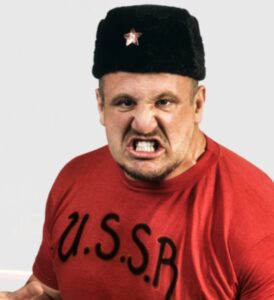
It’s always a more interesting race when Russia has a top competitor going up against good ol’ USA. Having a long-time foil in the competition makes each victory feel even sweeter.
If you’re old enough to remember, the US Olympic team boycotted the 1980 Olympic summer games in Moscow to protest the USSR’s invasion of Afghanistan. In 1984, the Russians reciprocated by boycotting the summer Olympics held in Los Angeles.
The next summer Olympic Games will be held in 2028 in Los Angeles.
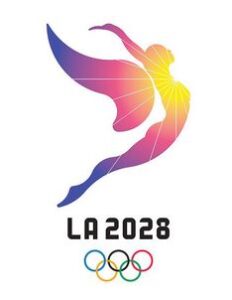
Uh, oh. Here we go again!

